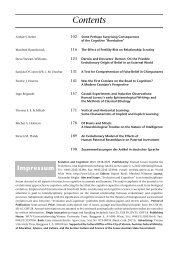The Seven Sins of Evolutionary Psychology - Konrad Lorenz Institute
The Seven Sins of Evolutionary Psychology - Konrad Lorenz Institute
The Seven Sins of Evolutionary Psychology - Konrad Lorenz Institute
You also want an ePaper? Increase the reach of your titles
YUMPU automatically turns print PDFs into web optimized ePapers that Google loves.
<strong>Evolutionary</strong> Ethicsdifferent—much more turbulent—outcome. 13Where conventions exist to regulate behaviour thataffects others in significant ways, those conventionsmay be thought <strong>of</strong> as ‘moral’ conventions, and willbe seen as having significant moral force.Note also that implicit in the definition <strong>of</strong> a conventionis the fact that any given convention will bebut one <strong>of</strong> several possible ones for that situation. 14That is, a convention is not a regularity <strong>of</strong> behaviourstrongly determined either by human nature or theenvironment. But neither (contrary to one commonusage <strong>of</strong> the term) are conventions entirely arbitrary.Some norms may be arbitrary, but conventionsnever are. As defined here, a convention is sustainedin part by an interest in coordination: thus conventionsalways serve some useful purpose. GAUTHIER,for one, agrees with this strengthening <strong>of</strong> the term.GAUTHIER (1977, pp333–334) writes that “…to supposethat what is conventional must therefore bearbitrary is entirely contrary to the spirit <strong>of</strong> contractarianism,which finds only in convention a sufficientrationale for society”. Further, “[t]o considersociety arbitrary is to suppose that it affords no sufficientfulfilment or meets no fundamental need <strong>of</strong>most or all <strong>of</strong> its members”. A working conventionis always one among several solutions to a problem—butit is a solution none the less.5. ConclusionI have argued that an evolutionary perspective hasthree main implications for moral theory. An evolutionaryperspective has implications for value theory(suggesting a subjective, relative theory <strong>of</strong>value), can guide us in interpreting the extent towhich various candidate moral rules are consistentwith human moral psychology, and can help usunderstand the function <strong>of</strong> different moral rules instrategic interaction. And each <strong>of</strong> these implicationspushes us toward a conventionalist understanding<strong>of</strong> ethics.A full examination <strong>of</strong> the significance <strong>of</strong> socialconventions for moral theory is beyond the scope <strong>of</strong>this paper. I will limit myself to making a few broad,programmatic remarks.First, we should pay attentionto the extent to which existing socialconventions structure socialinteraction and moral choice. Oftentimes, conventions will be sowell entrenched (and so psychologicallyingrained) that we willnot see ourselves as facing decisionsat all. Further, existing conventions structureindividual moral choices in that it is by reference toexisting standards that we justify our actions to others.Justification is not an abstract quality: it is alwaysa matter <strong>of</strong> justification to someone. 15 To the extentto which we are concerned with justifying our actionsto members <strong>of</strong> our own communities, we willneed to pay attention to the actual standards—existing,acknowledged social conventions—that applythere, rather than to hypothetical or ideal ones. 16 Weshould never be satisfied to rely upon existing standards;existing social conventions can <strong>of</strong>ten be improvedupon. But where conventions exist, they willneed to be heeded; their contribution must be analysed,and they should be ignored only when a plausiblealternative is in sight.Secondly, we should examine the extent to whichconventions should be seen as having normativeforce. Conventions represent—by definition—workingsolutions to social problems. Conventions aremutually beneficial, and thus have some motivationalforce. But conventions will not always beequally beneficial. Some conventions, for example,will be asymmetrical in that they reflect, rather thanmitigate, power imbalances between the parties involved.<strong>The</strong> possibility <strong>of</strong> asymmetrical conventionsis both a challenge to the notion <strong>of</strong> conventions asnormative, and a challenge to the common presumptionthat the notion <strong>of</strong> equity is essential tomorality.Finally, we need to investigate the possibility <strong>of</strong>seeing conventions as a moral technology, and askwhether we can build new conventions to remedyexisting social problems. If existing conventionsserve a useful function, then perhaps we can takewhat we have learned about conventions and applythat knowledge in a forward–looking manner. One<strong>of</strong> the implications <strong>of</strong> this line <strong>of</strong> thought is thatgood conventions make good moral choices easier.It might even be said that the ‘real action’ <strong>of</strong> moralitygoes on long before the individual is ever faced witha decision. This points to a need for attention to thebuilding, rather than the following, <strong>of</strong> moral rules.Is it possible to engineer new conventions? Are theresome kinds <strong>of</strong> conventions which are impossible tobuild and maintain, andAuthor’s addressChris MacDonald, Department <strong>of</strong> Bioethics,Dalhousie University, 5849 University Ave.,Halifax, Nova Scotia, Canada, B3H 4H7.Email: chris.macdonald@dal.cawhich therefore oughtnot to be sought after? Ofcourse, this possibility dependsupon further investigation<strong>of</strong> the processesby which conventions (asa sub-set <strong>of</strong> social normsEvolution and Cognition ❘ 103 ❘ 2001, Vol. 7, No. 1








